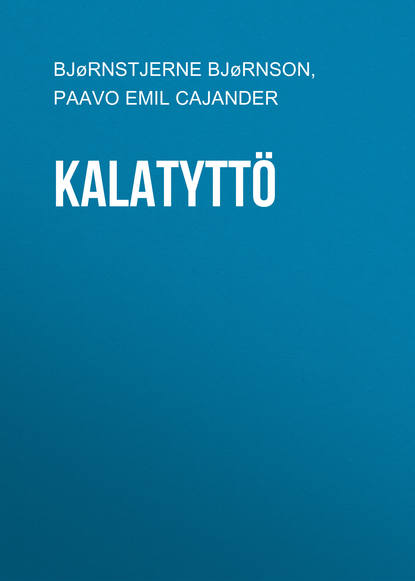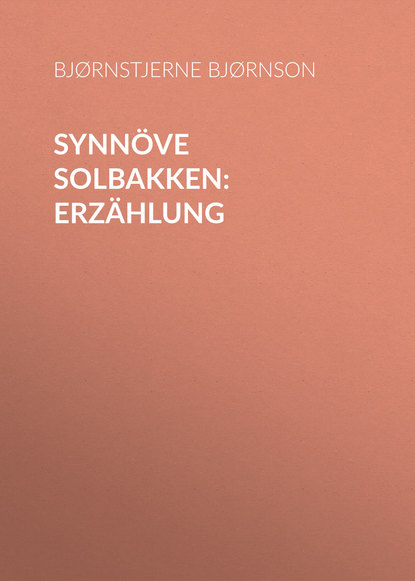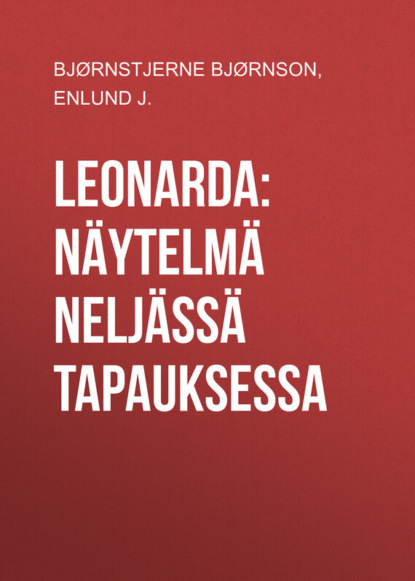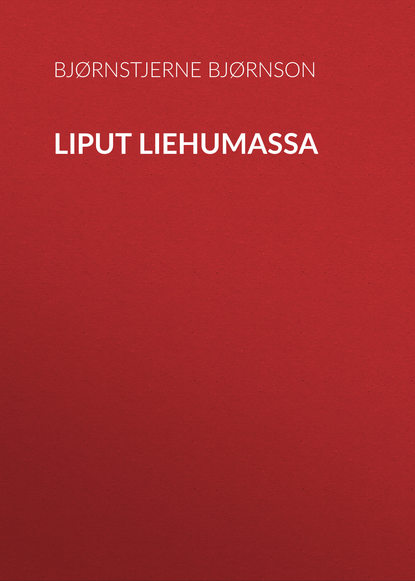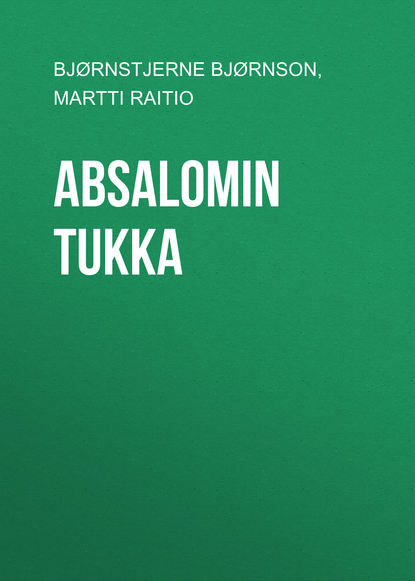
Полная версия
Arne; Early Tales and Sketches
It was a little after midnight, and they had to be there with the dead man until day dawned. Arne crossed the floor, and made a great fire on the hearth, the mother sat down by it. And now, as she sat there, it rushed through her mind how many evil days she had had with Nils; and then she thanked God, in a loud, fervent prayer, for what He had done. "But I have truly had some good days also," said she, and wept as though she regretted her recent thankfulness; and it ended in her taking the greatest blame on herself who had acted contrary to God's commandment, out of love for the departed one, had been disobedient to her mother, and therefore had been punished through this sinful love.
Arne sat down directly opposite her. The mother's eyes were fixed on the bed.
"Arne, you must remember that it was for your sake I bore it all," and she wept, yearning for a loving word in order to gain a support against her own self-accusations, and comfort for all coming time. The boy trembled and could not answer. "You must never leave me," sobbed she.
Then it came suddenly to his mind what she had been, in all this time of sorrow, and how boundless would be her desolation should he, as a reward for her great fidelity, forsake her now.
"Never, never!" he whispered, longing to go to her, yet unable to do so.
They kept their seats, but their tears flowed freely together. She prayed aloud, now for the dead man, now for herself and her boy; and thus, amid prayers and tears, the time passed. Finally she said: —
"Arne, you have such a fine voice, you must sit over by the bed and sing for your father."
And it seemed as though strength was forthwith given him to do so. He got up, and went to fetch a hymn-book, then lit a torch, and with the torch in one hand, the hymn-book in the other, he sat down at the head of the bed and, in a clear voice, sang Kingo's one hundred and twenty-seventh hymn: —
"Turn from us, gracious Lord, thy dire displeasure!Let not thy bloody rod, beyond all measure,Chasten thy children, laden with sore oppressions,For our transgressions."9CHAPTER V
Arne became habitually silent and shy. He tended cattle and made songs. He passed his nineteenth birthday, and still he kept on tending cattle. He borrowed books from the priest and read; but he took interest in nothing else.
The priest sent word to him one day that he had better become a school-master, "because the parish ought to derive benefit from your talents and knowledge." Arne made no reply to this; but the next day, while driving the sheep before him, he made the following song: —
"Oh, my pet lamb, lift your head,Though the stoniest path you tread,Over the mountains lonely,Still your bells follow only."Oh, my pet lamb, walk with care,Lest you spoil all your wool beware,Mother must soon be sewingSkins for the summer's going."Oh, my pet lamb, try to growFat and fine wheresoe'er you go!Know you not, little sweeting,A spring lamb is dainty eating!"10One day in his twentieth year Arne chanced to overhear a conversation between his mother and the wife of the former gard owner; they were disputing about the horse they owned in common.
"I must wait to hear what Arne says," remarked the mother.
"That lazy fellow!" was the reply. "He would like, I dare say, to have the horse go ranging about the woods as he does himself."
The mother was now silent, although before she had been arguing her own case well.
Arne turned as red as fire. It had not occurred to him before that his mother might have to listen to taunting words for his sake, and yet perhaps she had often been obliged to do so. Why had she not told him of this?
He considered the matter well, and now it struck him that his mother scarcely ever talked with him. But neither did he talk with her. With whom did he talk, after all?
Often on Sunday, when he sat quietly at home, he felt a desire to read sermons to his mother, whose eyes were poor; she had wept too much in her day. But he did not have the courage to do so. Many times he had wanted to offer to read aloud to her from his own books, when all was still in the house, and he thought the time must hang heavily on her hands. But his courage failed him for this too.
"It cannot matter much. I must give up tending the herds, and move down to mother."
He let several days pass, and became firm in his resolve. Then he drove the cattle far around in the wood, and made the following song: —
"The vale is full of trouble, but here sweet Peace may reign;Within this quiet forest no bailiffs may distrain;None fight, as in the vale, in the Blessed Church's name,Yet if a church were here, it would no doubt be just the same."How peaceful is the forest: – true, the hawk is far from kind,I fear he now is striving the plumpest sparrow to find;I fear yon eagle's coming to rob the kid of breath,And yet perchance if long it lived, it might be tired to death."The woodman fells one tree, and another rots away,The red fox killed the lambkin white at sunset yesterday;The wolf, though, killed the fox, and the wolf itself must die,For Arne shot him down to-day before the dew was dry."I'll hie me to the valley back – the forest is as bad;And I must see to take good heed, lest thinking drive me mad.I saw a boy in my dreams, though where I cannot tell —But I know he had killed his father – I think it was in Hell."11He came home and told his mother that she might send out in the parish after another herd-boy; he wanted to manage the gard himself. Thus it was arranged; but the mother was always after him with warnings not to overtax himself with work. She used also to prepare such good meals for him at this time that he often felt ashamed; but he said nothing.
He was working at a song, the refrain of which was "Over the lofty mountains." He never succeeded in finishing it, and this was chiefly because he wanted to have the refrain in every other line; finally he gave it up.
But many of the songs he made got out among the people, where they were well liked; there were those who wished very much to talk with him, especially as they had known him from boyhood up. But Arne was shy of all whom he did not know, and thought ill of them, chiefly because he believed they thought ill of him.
His constant companion in the fields was a middle-aged man, called Upland Knut, who had a habit of singing over his work; but he always sang the same song. After listening to this for a few months, Arne was moved to ask him if he did not know any others.
"No," was the man's reply.
Then after the lapse of several days, once when Knut was singing his song, Arne asked:
"How did you chance to learn this one?"
"Oh, it just happened so," said the man.
Arne went straight from him into the house; but there sat his mother weeping, a sight he had not seen since his father's death. He pretended not to notice her, and went toward the door again; but he felt his mother looking sorrowfully after him again and he had to stop.
"What are you crying for, mother?"
For a while his words were the only sound in the room, and therefore they came back to him again and again, so often that he felt they had not been said gently enough. He asked once more: —
"What are you crying for?"
"Oh, I am sure I do not know;" but now she wept harder than ever.
He waited a long time, then was forced to say, as courageously as he could: —
"There must be something you are crying about!"
Again there was silence. He felt very guilty, although she had said nothing, and he knew nothing.
"It just happened so," said the mother. Presently she added, "I am after all most fortunate," and then she wept.
But Arne hastened out, and he felt drawn toward the Kamp gorge. He sat down to look into it, and while he was sitting there, he too wept. "If I only knew what I was crying for," mused Arne.
Above him, in the new-plowed field, Upland Knut was singing his song: —
"Ingerid Sletten of Willow-poolHad no costly trinkets to wear;But a cap she had that was far more fair,Although it was only of wool."It had no trimming, and now was old,But her mother who long had goneHad given it her, and so it shoneTo Ingerid more than gold."For twenty years she laid it aside,That it might not be worn away;'My cap I'll wear on that blissful dayWhen I shall become a bride.'"For thirty years she laid it asideLest the colors might fade away.'My cap I'll wear when to God I prayA happy and grateful bride.'"For forty years she laid it aside,Still holding her mother as dear;'My little cap, I certainly fearI never shall be a bride.'"She went to look for the cap one dayIn the chest where it long had lain;But ah! her looking was all in vain, —The cap had moldered away."12Arne sat and listened as though the words had been music far away up the slope. He went up to Knut.
"Have you a mother?" asked he.
"No."
"Have you a father?"
"Oh, no; I have no father."
"Is it long since they died?"
"Oh, yes; it is long since."
"You have not many, I dare say, who care for you?"
"Oh, no; not many."
"Have you any one here?"
"No, not here."
"But yonder in your native parish?"
"Oh, no; not there either."
"Have you not any one at all who cares for you?"
"Oh, no; I have not."
But Arne went from him loving his own mother so intensely that it seemed as though his heart would break; and he felt, as it were, a blissful light over him. "Thou Heavenly Father," thought he, "Thou hast given her to me, and such unspeakable love with the gift, and I put this away from me; and one day when I want it, she will be perhaps no more!" He felt a desire to go to her, if for nothing else only to look at her. But on the way, it suddenly occurred to him: "Perhaps because you did not appreciate her you may soon have to endure the grief of losing her!" He stood still at once. "Almighty God! what then would become of me?"
He felt as though some calamity must be happening at home. He hastened toward the house; cold sweat stood on his brow; his feet scarcely touched the ground. He tore open the passage door, but within the whole atmosphere was at once filled with peace. He softly opened the door into the family-room. The mother had gone to bed, the moon shone full in her face, and she lay sleeping calmly as a child.
CHAPTER VI
Some days after this, mother and son, who of late had been more together, agreed to be present at the wedding of some relatives at a neighboring gard. The mother had not been to any party since she was a girl.
They knew few people at the wedding, save by name, and Arne thought it especially strange that everybody stared at him wherever he went.
Once some words were spoken behind him in the passage; he was not sure, but he fancied he understood them, and every drop of blood rushed into his face whenever he thought of them.
He could not keep his eyes off the man who had spoken these words; finally, he took a seat beside him. But as he drew up to the table he thought the conversation took another turn.
"Well, now I am going to tell you a story, which proves that nothing can be buried so deep down in night that it will not find its way into daylight," said the man, and Arne was sure he looked at him. He was an ill-favored man, with thin, red hair encircling a great, round brow. Beneath were a pair of very small eyes and a little bottle-shaped nose; but the mouth was very large, with very pale, out-turned lips. When he laughed, he showed his gums. His hands lay on the table: they were clumsy and coarse, but the wrists were slender. He looked sharp and talked fast, but with much effort. People nicknamed him the Rattle-tongue, and Arne knew that tailor Nils had dealt roughly with him in the old days.
"Yes, there is a great deal of wickedness in this world; it comes nearer home to us than we think. But no matter; you shall hear now of an ugly deed. Those who are old remember Alf, Scrip Alf. 'Sure to come back!' said Alf; that saying comes from him; for when he had struck a bargain – and he could trade, that fellow! – he flung his scrip on his back. 'Sure to come back,' said Alf. A devilish good fellow, fine fellow, splendid fellow, this Alf, Scrip Alf!
"Well, there was Alf and Big Lazy-bones – aye, you knew Big Lazy-bones? – he was big and he was lazy too. He looked too long at a shining black horse Scrip Alf drove and had trained to spring like a summer frog. And before Big Lazy-bones knew what he was about, he had given fifty dollars for the nag Big Lazy-bones mounted a carriole,13 as large as life, to drive like a king with his fifty-dollar horse; but now he might lash and swear until the gard was all in a smoke; the horse ran, for all that, against all the doors and walls that were in the way; he was stone blind.
"Afterwards, Alf and Big Lazy-bones fell to quarreling about this horse all through the parish, just like a couple of dogs. Big Lazy-bones wanted his money back; but you may believe he never got so much as two Danish shillings. Scrip Alf thrashed him until the hair flew. 'Sure to come back,' said Alf. Devilish good fellow, fine fellow, splendid fellow, this Alf – Scrip Alf.
"Well, then, some years passed by without his being heard of again.
"It might have been ten years later that he was published on the church hill;14 there had been left to him a tremendous fortune. Big Lazy-bones was standing by. 'I knew very well,' said he, 'that it was money that was crying for Scrip Alf, and not people.'
"Now there was a great deal of gossip about Alf; and out of it all was gathered that he had been seen last on this side of Rören, and not on the other. Yes, you remember the Rören road – the old road?
"But Big Lazy-bones had succeeded in rising to great power and splendor, owning both farm and complete outfit.
"Moreover, he had professed great piety, and everybody knew he did not become pious for nothing – any more than other folks do. People began to talk about it.
"It was at this time that the Rören road was to be changed, old-time folks wanted to go straight ahead, and so it went directly over Rören; but we like things level, and so the road now runs down by the river. There was a mining and a blasting, until one might have expected Rören to come tumbling down. All sorts of officials came there, but the amtmand15 oftenest of all, for he was allowed double mileage. And now, one day while they were digging down among the rocks, some one went to pick up a stone, but got hold of a hand that was sticking out of the rocks, and so strong was this hand that it sent the man who took hold of it reeling backwards. Now he who found this hand was Big Lazy-bones. The lensmand16 was sauntering about there, he was called, and the skeleton of a whole man was dug out. The doctor was sent for too; he put the bones so skillfully together that now only the flesh was wanting. But people claimed that this skeleton was precisely the same size as Scrip Alf. 'Sure to come back!' said Alf.
"Every one thought it most strange that a dead hand could upset a fellow like Big Lazy-bones, even when it did not strike at all. The lensmand talked seriously to him about it, – of course when no one was by to hear. But then Big Lazy-bones swore until everything grew black about the lensmand.
"'Well, well,' said the lensmand, 'if you had nothing to do with this, you are just the fellow to go to bed with the skeleton to-night; hey?' 'To be sure I am,' replied Big Lazy-bones. And now the doctor jointed the bones firmly together, and placed the skeleton in one of the beds of the barracks. In the other Big Lazy-bones was to sleep, but the lensmand laid down in his gown, close up to the wall. When it grew dark and Big Lazy-bones had to go in to his bed-fellow, it just seemed as though the door shut of itself, and he stood in the dark. But Big Lazy-bones fell to singing hymns, for he had a strong voice. 'Why are you singing hymns?' asked the lensmand, outside of the wall. 'No one knows whether he has had the chorister,' answered Big Lazy-bones. Afterward he fell to praying with all his might. 'Why are you praying?' asked the lensmand, outside of the wall. 'He has no doubt been a great sinner,' answered Big Lazy-bones. Then for a long time all was still, and it really seemed as though the lensmand must be sleeping. Then there was a shriek that made the barracks shake. 'Sure to come back!' An infernal noise and uproar arose: 'Hand over those fifty dollars of mine!' bellowed Big Lazy-bones, and there followed a screaming and a wrestling; the lensmand flung open the door, people rushed in with sticks and stones, and there lay Big Lazy-bones in the middle of the floor, and on him was the skeleton."
It was very still around the table. Finally a man who was about to light his clay pipe, said: —
"He surely went mad after that day."
"He did."
Arne felt every one looking at him, and therefore he could not raise his eyes.
"It is, as I have said," put in the first speaker; "nothing can be buried so deep down in night that it will not find its way into daylight!"
"Well, now I will tell about a son who beat his own father," said a fair, heavily-built man, with a round face. Arne knew not where he was sitting.
"It was a bully of a powerful race, over in Hardanger; he was the ruin of many people. His father and he disagreed about the yearly allowance, and the result of this was that the man had no peace at home or in the parish.
"Owing to this he grew more and more wicked, and his father took him to task. 'I will take rebuke from no one,' said the son. 'From me you shall take it as long as I live,' said the father. 'If you do not hold your tongue I will beat you,' said the son, and sprang to his feet. 'Aye, do so if you dare, and you will never prosper in the world,' answered the father, as he too rose. 'Do you think so?' – and the son rushed at him and knocked him down. But the father did not resist; he crossed his arms and let his son do as he chose with him.
"The son beat him, seized hold of him and dragged him to the door. 'I will have peace in the house!' But when they came to the door, the father raised himself up. 'Not farther than to the door,' said he, 'for so far I dragged my own father.' The son paid no heed to this, but dragged his head across the threshold. 'Not farther than to the door, I say!' Here the old man flung his son down at his feet, and chastised him, just as though he were a child."
"That was badly done," said several.
"Did not strike his father, though," Arne thought some one said; but he was not sure of it.
"Now I shall tell you something," said Arne, rising up, as pale as death, not knowing what he was going to say. He only saw the words floating about him like great snow-flakes. "I will make a grasp at them hap-hazard!" and he began.
"A troll met a boy who was walking along a road crying. 'Of whom are you most afraid?' said the troll, 'of yourself, or of others?' But the boy was crying, because he had dreamed in the night that he had been forced to kill his wicked father, and so he answered, 'I am most afraid of myself.' 'Then be at peace with yourself, and never cry any more; for hereafter you shall only be at war with others.' And the troll went his way. But the first person the boy met laughed at him, and so the boy had to laugh back again. The next person he met struck him; the boy had to defend himself, and struck back. The third person he met tried to kill him, and so the boy had to take his life. Then everybody said hard things about him, and therefore he knew only hard things to say of everybody. They locked their cupboards and doors against him, so he had to steal his way to what he needed; he even had to steal his night's rest. Since they would not let him do anything good, he had to do something bad. Then the parish said, 'We must get rid of this boy; he is so bad'; and one fine day they put him out of the way. But the boy had not the least idea that he had done anything wicked, and so after death he came strolling right into the presence of the Lord. There on a bench sat the father he had not slain, and right opposite, on another bench, sat all those who had forced him to do wrong.
"'Which bench are you afraid of?' asked the Lord, and the boy pointed to the long one.
"'Sit down there, beside your father,' said the Lord, and the boy turned to do so.
"Then the father fell from the bench, with a great gash in his neck. In his place there came one in the likeness of the boy, with repentant countenance and ghastly features; then another with drunken face and drooping form; still another with the face of a madman, with tattered clothes and with hideous laughter.
"'Thus it might have been with you,' said the Lord.
"'Can that really be?' replied the boy, touching the hem of the Lord's garment.
"Then both benches fell down from heaven, and the boy stood beside the Lord again and laughed.
"'Remember this when you awaken,' said the Lord, and at that moment the boy awoke.
"Now the boy who dreamed thus is I, and they who tempted him by thinking him wicked are you. I no longer fear myself, but I am afraid of you. Do not stir up my evil passions, for it is doubtful whether I may get hold of the Lord's garment."
He rushed out, and the men looked at each other.
CHAPTER VII
It was the next day, in the barn of the same gard. Arne had been drunk for the first time in his life, was ill in consequence of it, and had been lying in the barn almost twenty-four hours. Now, turning over, he had propped himself up on his elbows, and thus talked with himself: —
"Everything I look at becomes cowardice. That I did not run away when I was a boy, was cowardice; that I listened to father rather than to mother, was cowardice; that I sang those wicked songs for him was cowardice; I became a herd-boy, that was from cowardice; – I took to reading – oh, yes! that was from cowardice, too; I wanted to hide away from myself. Even after I was grown up, I did not help mother against father – cowardice; that I did not that night – ugh! – cowardice! I should most likely have waited until she was killed. I could not stand it at home after that – cowardice; neither did I go my way – cowardice; I did nothing, I tended cattle – cowardice. To be sure, I had promised mother to stay with her; but I should actually have been cowardly enough to break the promise, had I not been afraid to mingle with people. For I am afraid of people chiefly because I believe they see how bad I am. And it is fear of people makes me speak ill of them – cursed cowardice! I make rhymes from cowardice. I dare not think in a straightforward manner about my own affairs, and so I turn to those of others – and that is to be a poet.
"I should have sat down and cried until the hills were turned into water, that is what I should have done; but instead I say: 'Hush, hush!' and set myself to rocking. And even my songs are cowardly; for were they courageous they would be better. I am afraid of strong thoughts; afraid of everything that is strong; if I do rise up to strength, it is in a frenzy, and frenzy is cowardice. I am more clever, more capable, better informed than I seem to be. I am better than my words; but through cowardice I dare not be what I am. Fy! I drank brandy from cowardice; I wanted to deaden the pain! Fy! it hurt. I drank, nevertheless; drank, nevertheless; drank my father's heart's blood, and yet I drank! The fact is, my cowardice is beyond all bounds; but the most cowardly thing of all is that I can sit here and say all this to myself.
"Kill myself? Pooh! For that I am too cowardly. And then I believe in God, – yes, I believe in God. I long to go to Him; but cowardice keeps me from Him. From so great a change a cowardly person winces. But what if I tried as well as I am able? Almighty God! What if I tried? I might find a cure that even my milksop nature could bear; for I have no bone in me any longer, nor gristle; only something fluid, slush… What if I tried, with good, mild books, – I am afraid of the strong ones, – with pleasant stories and legends, all such as are mild; and then a sermon every Sunday and a prayer every evening, and regular work, that religion may find fruitful soil; it cannot do so amid slothfulness. What if I tried, dear, gentle God of my childhood, – what if I tried?"
But some one opened the barn-door, and hurried across the floor, pale as death, although drops of sweat rolled down the face. It was Arne's mother. It was the second day she had been seeking for her son. She called his name but did not pause to listen; only called and rushed about, till he answered from the hay-mow, where he was lying. She gave a loud shriek, sprang to the mow more lightly than a boy, and threw herself upon him.





